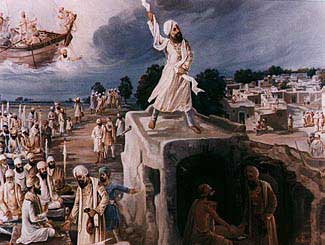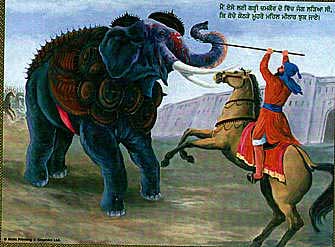
We present an article on Lubanas by S.Jaswant Singh which appeared in 'Sikhstudies.org'. Our thanks to both. (Kanwal)
LOBANAS
VANJARAS SIKLIGARS -OUR FORGOTTEN BRETHREN
Historical
Background
These Sikhs tribes are forgotten brethren of Sikhs.
Sikligar name was given by the 10th Guru to those descendants of Bhai Ram Singh
(Marwari Lohar) who would manufacture weapons for war and then polish them (Sikli
means to polish). According to history there are two Ram Singhs, one described
above and another Ram Singh Parmar, grandson of Bhai Mani Singh, who fought alongside
Guru Gobind Singh at Chamkaur Sahib. He was expert in wielding weapons, and was
arrested alongwith Banda Bahadur and martyred in Delhi. Sikligar history is traceable
only after 1595 AD. Three Marwari tribes are intimately related to Sikhism and
suffered martyrdom since Guru Hargobind's time. These are Rathores, Pawars / Parmars
and Chauhans. Earlier, Maula Bakhsh used to manufacture Guru's weapons, but later
the Guru sent for Marwari weapon makers, Bhai Kehar Singh Rajput's services were
availed of. With him came many others in the trade. When peace prevailed after
Guru Hargobind's times, these craftsmen returned to Marwar but were disowned by
their brethren. Thus they became Vanjaras, roaming artisans. Suddenly good days
returned during Guru Gobind Singh's time as weapons were required again, Vanjaras
came into Sikh mainstream. For all practical purposes Lobanas, Vanjaras and Sikligars
fall in the same clan.
Their number and famous members
It is very difficult to give a definite assessment of their number. According
to Dr Harbhajan Singh, Punjabi University, Patiala research, they number about
5 crores and are settled in 20,000 clusters called Tandas, they claim their origin
from Rajputana and as said before call themselves Rajputs. Right from Guru Nanak's
time under the influence of Bhai Mansukh, Sri Lanka's King Shiv Nabh embraced
Sikhism.

Makhan Sha Lobana declaring that 'the Guru has been found'
There are some well known Lobana Sikhs, Makhan Shah Lobana who identified Guru Tegh Bahadur out of 22 imposters at Baba Bakala, Bhai Lakhi Shah Vanjara took the martyred body of Guru Tegh Bahadur from Chandni Chowk in 1675 AD and cremated it, putting his house on fire (Rakab Ganj Gurdwara in Delhi is the site) Bhai Uday Singh, Bhai Bachittar Singh, both brothers were Vanjaras, the latter attacked the drunken Mughal elephant at Guru Gobind Singh's command. Vanajaras and Sikligars helped Banda Bahadur with both men and material in his campaigns of Punjab especially Sirhind. Banda Bahadur appointed Bhai Baj Singh Rajput, as the Governor of Sirhind.

Bhai Bachitter Singh fighting the drunken elephant with the Nagni Spear
Nearer
home, 13 Ragi Jathas and 30 granthis after training at Sach Khand. Nanded are
busy in propagating the Guru's message.
During Guru Gobind Singh's times these
Sikligars used to manufacture swords, rifles and pistols but due to legal restrictions
now they are reduced to making only steel pans and kettles. When masands stopped
Guru Tegh Bahadur from entering Harimandir Sahib, Makhan Shah Labana was accompanying
him. Bibi Jagir Kaur, Ex-President of SGPC belongs to Labana community. Her father-in-law
Baba Harnam Singh, a Minister in Punjab Cabinet converted lots of tribals of West
Punjab to Sikhism. After partition his headquarters shifted to Begowal, Distt.
Kapurthala.
SGPC Role
SGPC has taken bold
initiatives in ameliorating the condition of these tribes. A Vanjara Trust with
Chief Justice Harbans Singh as President and Dr Kharak Singh as Secretary with
Rs. 15 lacs as corpus money has been started at Chandigarh. Some of the suggested
tasks for their improvement are :-
1. Granthis and preachers be provided after
establishing Gurdwaras in Labana villages and Sikligar Tandas. Gurpurbs be celebrated
in these Gurdwaras.
2. Their children should be given basic teaching in Punjabi
language.
3. Vanjaras have lands but no means of productivity. Financial assistance
will be very valuable. This assistance must reach the users. An effort was made
to settle them as farm hands in rural Punjab. The Punjab farmers were keen to
employ them, two batches of them were shown around the countryside of Punjab and
were ensured employment. The batches went home happy but never returned to take
up jobs in Punjab. It appears they are reluctant to take the risk of coming over
alone. Even with families, they are reluctant to come. Although they belong to
an enterprising community of Sikhs, they seem to have lost their nerve over years.
They require to be rejuvenated, resuscitated and re-ensured. If Bhayyas from UP,
Bihari and inhabitants from other provinces can come to Punjab to make a labour
force and technical hands, why not these Sikh brethren ?
4. Small scale industries
may be started for Sikligars.
5. Preference be give to Sikh Vanjaras and Sikligars
as labour force to keep them above the poverty line.
6. Their women folk be
trained in tailoring, knitting and day-care help for children.
EXCERPTS from
a visit by Major Singh staff reporter Daily Ajit, a Punjabi daily from Jalandhar.
His visit to Talegaon near Nagpur, Maharashtra brought out :-
a) Sikhs
there consider cutting their hair as turning their back towards the Guru;
b)
that their roots are in Rajasthan, they are Rajputs;
c) their population is
about 2 crores, for centuries they are gypsies staying in jungles;
d) inspite
of their poverty, they are still addressed as Sardars;
e) their next generation
is sore since they have been neglected by rich religious and political leaders
from the cities;
f) these people are still illiterate, their children have
no access to any school;
g) they are well entrenched in Sikhism and no amount
of efforts by other communities have lured them away;
h) In provinces of Maharashtra,
Andhra and Madhya Pradesh these tribes call themselves Sikhs. They also suffered
humiliation / harassment during 1984 Sikh massacres;
i) they are only Gurus
disciples and not given to belief in witch craft, and spurious sants, j) they
believe in manual labour;
k) remarriage among women folk is not permitted;
i) birth of a girl child is not considered a burden. Infact, they have all
pristine Sikh virtues, no modern Sikh vices, poverty is their crushing problem.
Vanjaras
Vanjaras consider themselves followers of Guru Nanak and Lakhi
Shah Vanjara (Labana) their leader and legacy. They number 71 lacs in Andhra,
67 lacs in Karnataka, 62 lacs in Maharastra, 58 lacs in UP, 52 lacs in Rajasthan,
47 lacs in MP, 33 lacs in Orissa, 35 lacs in Bihar and 18 lacs in Gujarat. About
80% of Vanjaras are below poverty line and are illiterate. They organised a demand
march from Gurdwara Rakab Ganj to Parliament house (a large hall in memory of
Lakhi Shah Vanjara has been built in this Gurdwara). They demanded that according
to Mandal Commission, out of 27% reservation for backward classes, 7% be reserved
for Vanjaras. Their abject poverty is evident when not only two square meals are
a problem, they do not have enough to cover their bare bodies. These are hair-raising
revelations. I am sure, Sikh community is prosperous, is generous, is benevolent
but is oblivious of the plight of Sikligars, Vanjaras and Labanas. We are in deep
slumber.
I feel, to save them from being devoured by other faiths we the Sikhs
should
i. Through SGPC and Dharam Parchar Committee keep their faith in Sikhism
aloft and ablaze. It is a gigantic task but we can do it by institutional co-operation.
ii. Involve other Sikh institutions like Delhi Sikh Gurdwara Management Committee,
Institute of Sikh Studies, latter for highlighting their plight in Sikh fora.
iii. Large Gurdwaras like Guru Tegh Bahadur Sahib, Sector 34, Chandigarh and
such other gurdwaras adopt villages or cluster of villages of these poor tribes
and provide religious and financial help directly or through the Vanjara Trust..
iv. Gurmat Prasar Seva Society, Chandigarh and other missionary institutions
can provide Sikh missionaries for preaching Sikhism, teaching Punjabi, distributing
Gutkas, providing Guru Granth Sahib Birs and help establish Gurdwaras in their
villages. In some villages they perform all their religious ceremonies around
a Gutka as they have not seen Guru Granth Sahib.
v. All the schemes require
liberal finances, we should mobilise funds ensuring their transparent utilisation.
It is a gigantic task, let us make a collective beginning.
Time is running
out. Whereas Christianity is spreading by persuasion/propaganda, Islam is spreading
by all means, Sikhism, the universal religion is shrinking, at least not spreading.
Here is a God-sent opportunity to serve the cause of Sikhism through amelioration
of the plight of these tribes, so that they can make their contribution towards
glory of the Panth, as respectable members and equal partners. It is a duly of
all Sikhs, particularly the affluent section to contribute liberally for programmes
of education, religious preaching and economic development. They are still holding
on to Sikhism, let us bring them in Sikh mainstream.
References
Gurmat
Parkash, October 2002 (pages 11-43) Monthly Journal of Dharam Parchar Committee,
SGPC, Amritsar.
Guru Shabad Ratankar Mahan Kosh
Sikligar Kabila - Sher
Singh Sher
Sikligar Parsang - Buddha Dal
Guru De Sher - Dr Harjinder Singh
Dilgeer
FOR MORE INFORMATION SEE THE FOLLOWING WEB SITES: